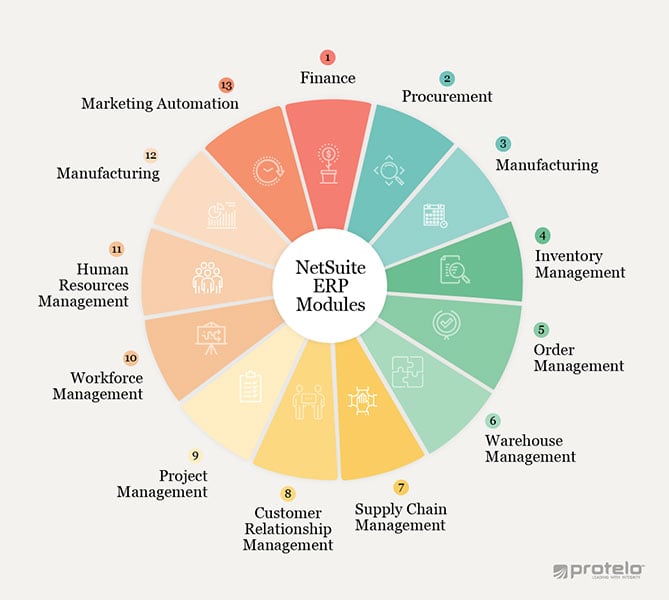15 min read
How to Choose the Right ERP for Your Business: A Step-by-Step-Guide
By: Protelo Editorial Team Feb 16, 2023

Expert advice on selecting the right ERP system for your business
How do you know which ERP is right for your business? Selecting an ERP system requires careful consideration and research. With 25+ years of experience in the software industry, our team has compiled a list of helpful steps to help you in the process of selecting an ERP system that best fits your business.
There is a lot of information about enterprise resource planning (ERP) systems and their benefits, but how does a business calculate the ROI of an ERP? As a business expands, so does the complexity of running on multiple applications that are prone to errors, time-consuming manual tasks, and data inconsistencies.
ERP integrates and automates core business functions into a unified platform to access data in real-time and to make better, faster, business decisions. Having the proper ERP in place will reduce error, increase efficiency, lower complexity, and save your business money.
Follow these tips to find the right ERP:
STEP 1 | Pinpoint your business requirements:
First, you need to identify your business needs and goals. Analyze your current processes, establish the areas that need improvement, and highlight the functionalities you require to improve productivity and efficiency in your business.
STEP 2 | Determine a budget:
Set an amount of how much you are willing to spend on an ERP system. Consider both the upfront costs, implementation, potential customization, and ongoing services. Many successful companies look at ERP as a core investment with tangible ROI through increased efficiency and visibility. Companies that look at ERP as solely an expense risk choosing the wrong ERP solely based on price.
STEP 3 | Analyze different ERP systems:
Do your research! Compare the features, functionalities, and pricing of many different ERP systems to see what is designed for your industry and what fits your business requirements best. Many clients choose to research on their own, but contacting a consulting firm that specializes in ERP software you are interested in is a great way to get hands-on help in your buyer’s journey.
STEP 4 | Select a software that meets your business needs:
Select a knowledgeable partner or reseller who has experience implementing ERP systems for businesses in your industry. Make sure to reach out to their references to make sure they are a good fit for your business.
ERP BUYERS GUIDE: COMPARE ERP SYSTEMS
- Odoo vs NetSuite: Comparison and Review
- Quickbooks vs NetSuite: Biggest Differences
- What is Cloud ERP Guide
- Xero vs NetSuite: A Comparison List
- Intacct vs NetSuite: ERP Evaluation
- SAP vs NetSuite: Compare ERP Systems
- Sage vs NetSuite: Evaluation Guide
- Fishbowl vs NetSuite: Side-by-side Guide
- Microsoft vs NetSuite: ERP Software Tips
- Cloud ERP vs On-Premise Software
Don’t see what you’re looking for?
Contact our industry experts for additional software comparison guides.
STEP 5 | Assess the implementation process:
Evaluate the implementation process to ensure it aligns with your timeline and objectives. Consider the support and training provided to your employees during and after the implementation.
• Tips for a successful ERP implementation
STEP 6 | Set your business up for growth:
Make sure the ERP system can scale, grow, and evolve as your business changes to meet your needs now and into the future.
STEP 7 | Walk through the system:
Make sure to request a solution discovery session to gain a better understanding of the ERP system to see if it aligns with your requirements and exact needs. Make sure the software company you are working with can meet your time frame, your budget, and can streamline manual processes.
STEP 8 | Hire the right team of software experts
It is critical to have a team of software experts to work alongside you as a partnership! It is important to set your business up for success as you shift your entire organization onto a new platform and customize it to meet your growing complex needs. These software experts can walk you through every phase of the journey.
From demonstrations to purchasing, licensing, implementation, customization, and services. Many companies have different teams that assist only with part of the process. Learn the benefits of working with a software partner. Learn about the many benefits of partners.
STEP 9 | Implementation, Training, Customization & Ongoing Support
The entire implementation strategy usually consists of planning and preparation, configuration and data migration, testing, and training for your go-live date. Once you are up and running make sure your project manager can walk you through the system, train your staff, and support your business. Depending on the size of your company, a, ERP implementation can potentially become a full-time job for someone. Learn more about the steps to plan for an Implementation.
By carefully considering your business's specific needs and requirements, as well as your budget, and thoroughly evaluating different software vendors, you can make an informed decision that will lead to long-term success for your business.

How does NetSuite stand out from its ERP competitors?
Oracle NetSuite is the #1 cloud-based ERP on the market that offers a wide range of features and benefits that set it apart from its competitors in the ERP market. Here are some key ways in which NetSuite ERP stands out:
Extensive functionality: NetSuite ERP is a single, integrated platform that allows businesses to manage all aspects of their organization. NetSuite offers top-notch features and modules, including financial management, order management, inventory and supply chain management, human resources, CRM, e-commerce, and more.
Cloud-Based Benefits: NetSuite was built in the cloud, which means it’s scalable, agile, and grants the ability to tailor the software to meet your exact business needs for growth. NetSuite can be accessed from anywhere, anytime with an internet connection allowing decision makers to make up-to-the-minute business decisions and workforces with the access they need while on the go.
Powerful analytics and real-time reporting: NetSuite provides powerful insight into your business data with up-to-the-minute reporting, analytics capabilities, data visualization, customizable dashboards, and the ability to create reports quickly.
Flexibility & Scalability: NetSuite was created to scale and adapt as your business grows. From small businesses to large enterprises, NetSuite supports businesses of all sizes as they change, increase requirements, and expand over time. Learn the benefits of NetSuite.
Industry-specific solutions: NetSuite offers a range of industry-specific solutions, including software for manufacturing, retail, e-commerce, and more. From improved data integration and supply chain visibility solutions to warehouse management system benefits, NetSuite’s cloud platform provides newfound efficiency and insight into every facet of your business.
Overall, Oracle NetSuite ERP is a strong contender in the ERP market due to its features, flexibility, and scalability. Interested in learning more? We want the licensing purchasing process, implementation, customization, and training process to be seamless and collaborative with direct access to our knowledgeable team. We are here to make your business even better with the #1 cloud ERP software on the market. REQUEST A DEMONSTRATION
Why work with an award-winning NetSuite Solution Provider to learn more about NetSuite?
Discover why working with Protelo, Inc. is the ultimate choice for your Oracle NetSuite needs. Our team of NetSuite experts provides top-notch services, support, training, design, and development, all backed by exceptional customer service. Visit our client page to see the success stories of our featured customers and learn why companies choose to partner with us. With a track record of assisting hundreds of small, mid-market, and enterprise companies in achieving their business goals, our NetSuite team is ready to help you take your business to new heights.




